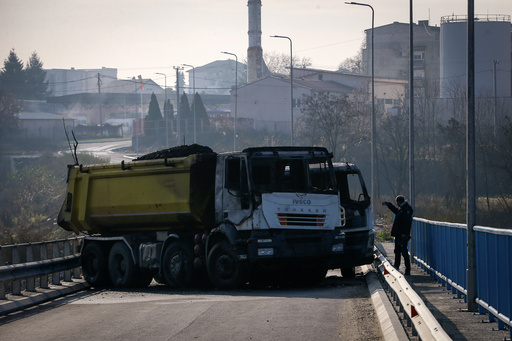Kosovo’s Prime Minister emphasized on Wednesday that fully reopening the bridge in Mitrovica would signify progress towards free movement and would not pose a threat to anyone. However, Western powers are expressing caution about the potential move, citing concerns that it could escalate tensions in the region.
The bridge in Mitrovica has been closed to passenger vehicle traffic for over ten years, with ethnic Serbs in the area frequently setting up barricades since 2011. They argue that allowing unrestricted passage would lead to “ethnic cleansing” against them if ethnic Albanians could freely cross into their part of the city in northern Kosovo.
Mitrovica is divided between a Serb-dominated north and an ethnic Albanian south, with limited interaction between the two communities.
Kosovo was formerly a Serbian province until a NATO bombing campaign in 1999 resulted in the end of the war between Serbian government forces and ethnic Albanian separatists. Serbia does not recognize Kosovo’s independence declared in 2008.
Currently, the bridge permits commercial and pedestrian traffic. Last year, the Mitrovica local assembly voted for the full reopening of the bridge to include passenger vehicles.
Despite the local decision, Western powers are concerned that allowing vehicle traffic over the bridge could reignite interethnic conflicts in the area.
Kosovo’s Prime Minister, Albin Kurti, stressed that the reopening of the bridge is aimed at promoting freedom of movement, adherence to the rule of law, and maintaining peace and security.
Kurti stated during a Cabinet meeting, “The bridge opening is against no one, least so against our partners. Kosovo is a normal state, and its bridges should be normal, too, which means open.”
Recently, ethnic Serbs in Kosovo’s north protested against the bridge’s opening, asserting that it has shielded them from potential ethnic cleansing. The Serbian government has also echoed this sentiment, calling for the bridge to remain closed.
The NATO-led Kosovo Force peacekeepers (KFOR) urged Pristina to avoid unilateral actions that could escalate tensions. KFOR has bolstered its presence along the Kosovo-Serbia border since last year’s unrest in northern Mitrovica.
Furthermore, five Western powers, including the United States, United Kingdom, France, Germany, and Italy, have advised Kosovo against opening the bridge to vehicular traffic at this time. U.S. Ambassador Jeffrey Hovenier highlighted the risks associated with the move, cautioning that it could heighten the potential for violence and other issues in the region.
Kosovo-Serbia relations remain strained, with the normalization talks facilitated by the European Union stalling. The EU and the U.S. are urging both sides to implement agreements reached by Serbian President Aleksandar Vu?i? and Prime Minister Kurti in early 2020.
The link to the original author’s work has been omitted to avoid plagiarism.


